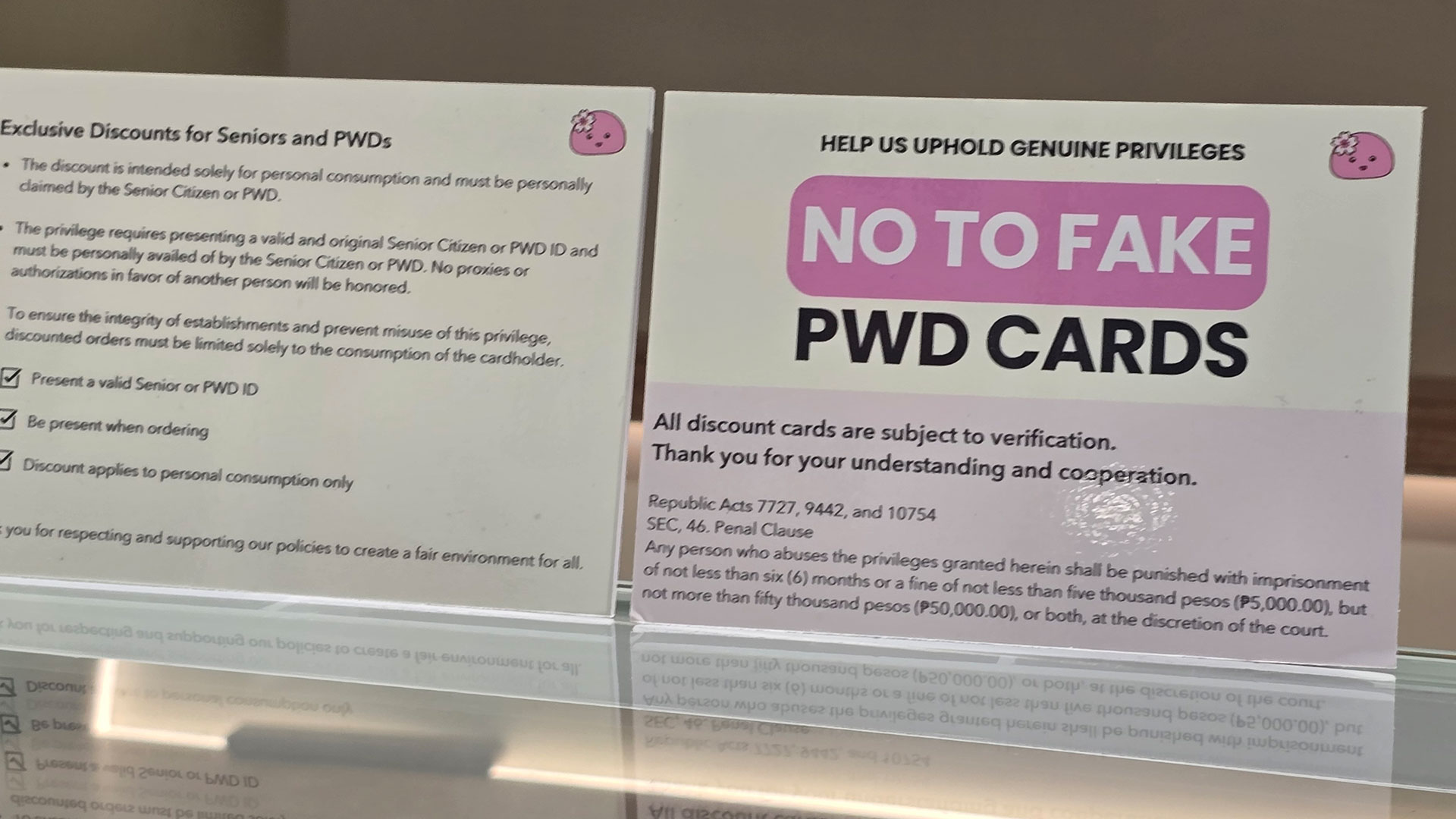Fake PWD IDs hurting restaurants’ bottom lines

by Patricia B. Mirasol, Producer
The discounts given to fake PWD (people with disabilities) IDs do make a dent on the bottom lines of restaurants, according to business owners.
On February 3, the Restaurant Owners of the Philippines published a statement on how fake PWD IDs are crippling the industry.
“The PWD discount was created to support those who genuinely need it, but widespread abuse of fake PWD cards is now putting a serious strain on restaurants and other businesses,” it said.
“For restaurants, especially small and family-run ones, this isn’t just an inconvenience – it’s a financial hit that can mean the difference between survival and closure. When multiple fake PWD cards are used at a single table, the losses can be devastating. This isn’t just about lost revenue; it affects employees, food quality, and even menu prices for honest customers,” the statement continued.
Most restaurants’ profit margins fall between 3% and 6%, although the number can go up to 15%, noted the Unilever Food Solutions’ website.
“It is very bad especially for bakeries all over the Philippines – a majority of which are mostly micro or small businesses, and with thin profit margins too on basic foods like breads and pastries,” Wilson Lee Flores, owner of Kamuning Bakery Cafe, said.
The bakery’s staff still has to find ways to distinguish fake PWD IDs from authentic ones, Mr. Flores texted on February 5.
“I hope our government can find ways to purge or clean up the misuse and shameless abuse of PWD IDs by dishonest people,” he said.
Greenery Kitchen doesn’t mind giving out PWD and senior citizen (SC) discounts, said its co-owner Ivy A. Villamor.
Some of the restaurant’s PWD customers even hesitate to use their IDs when they order, she said in a Viber message.
“Sana magkaron po ng (I hope there would be) specific parameters/guidelines on how to clearly compute for the SC/PWD discounts for food establishments. Maraming (There are a lot of) gray areas leading to different interpretations,” she said in a separate message*.
“I hope the process of applying and registering as a PWD – from the barangay to national levels – would be made more effective, so late registrations and updates at government websites can be avoided,” she added in the vernacular. “This way, legitimate PWDs can be protected, and their rights won’t be abused by those posing to have disabilities.”
PWD Rights
A PWD advocate said that the fake IDs issue shouldn’t be used to “oppress or embarrass” legitimate PWDs.
“Restaurant owners and certain bus companies are now exploiting a flawed DoH [Department of Health] website to evade their obligation to provide discounts to PWDs,” said Paolo A. Capino, himself a PWD.
“No number of margins in their business can justify the intentional embarrassment restaurant owners are doing against an already marginalized sector,” Mr. Capino’s February 5 statement on Messenger read.
What do restaurant discounts have to do with the welfare of PWDs, asked Filomeno S. Sta. Ana III, coordinator of Action for Economic Reforms and a columnist at BusinessWorld.
“Only those who can afford going to restaurants, not the common folks, benefit from this,” he said in a February 5 Viber message.
“The government can provide direct subsidies to PWDs instead of having price and tax discounts, which can be abused resulting in significant revenue leakage,” he said.
“Have a strict and rigorous definition of who qualifies as PWDs,” added Mr. Sta. Ana. “The interpretation is too relaxed.”
For Ms. Villamor, it’s not just fake IDs but taxes plus overhead costs that also contribute to the vegan food business’ already thin margins.
“Ang hirap naman magtaas ng presyo basta basta, kasi pag nasaktan ang customers, di sila makakabibili, and then eventually masasaktan din yun business... (It’s hard to raise prices, because if customers feel the pinch, then they won’t buy, which eventually hurts the business),” she said.
There are 2,008,233 registered PWDs in the Philippines as of February 11, according to the National Council on Disability Affairs. – with contributions from Edg Adrian Eva and Almira Louise Martinez



